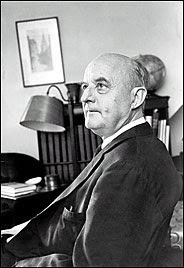
An interview (worth reading on its own) which ends with her favorite quote from her father, which is also a favorite of mine:
Nothing that is worth doing can be achieved in our lifetime; therefore we must be saved by hope. Nothing which is true or beautiful or good makes complete sense in any immediate context of history; therefore we must be saved by faith. Nothing we do, however virtuous, can be accomplished alone; therefore we are saved by love. No virtuous act is quite as virtuous from the standpoint of our friend or foe as it is from our standpoint. Therefore we must be saved by the final form of love which is forgiveness.
I am almost allergic to the topic of salvation, because it is almost always presented as something done to us, or for us; something from outside which we must accept to make effective. That's not an originally Christian idea; Christianity actually got it from Rome. Caesar, a divine figure in his own right, a divi filius (son of god), was the savior of Rome and all of Rome's subjects. Caesar saved those who lived under the empirical rule from the barbarians, the uncivilized (a notion they got from the Greeks, for whom the term meant literally those who don't speak Greek; that is, they babble, "barbarian" sounding in Greek like the language of non-Greek speakers. To this day in America we insist all real Americans speak American English. The more things change....). The salvation Caesar offered was the Pax Romana, which you refused at your peril (crucifixion being the punishment reserved for those who threatened the Pax).
In modern times it's an almost purely religious concept, but it still retains the sentiment that we will be saved by an outside force, that salvation will come to us and do for us what we cannot, or will not, do for ourselves. It's not a very Biblical idea, actually; but it also doesn't depend on an atonement soteriology that saves you from damnation in the next world no matter what happens in this one.
Niebuhr's idea of salvation is neatly captured in this quote. We must be saved by hope; by faith; by love; and by forgiveness. None of those are exterior to the human experience. None of those rely solely and explicitly on a certain Christian theology. Hope may be hope in Jesus Christ, but it needn't be. Faith is not belief "in what you know ain't so," it is merely trust; what you trust is another question. Love is perhaps the most difficult to define here, actually; and forgiveness is the hardest thing to do. How can you forgive without hope, faith, and love? And how can you have hope, faith, and love, without some belief in more than the merely material world?
But none of these, however we understand them, will come to us; we must find and use them. Hope, I would argue, is illusory without faith; faith is empty without love; love is nothing if it is not an activity; and forgiveness flows from all three together.
Is God a necessary component of this concept, this offered salvation? I would turn the question around: will you reject the possibility on that ground alone? If so, what salvation do you offer, and where does it come from? If you tell me it comes from reason, can I not say that is your "god"?
Because I can't distinguish it from any other outside source that will supposedly save us by making us all agree on what is important, and brutally rejecting what is not. Which is not the result I see from a formula based on hope, faith, love, and forgiveness.
I'm humbled. I'm certainly not deserving of that company.
ReplyDeleteBoy, do I need to edit better if that's going to happen.